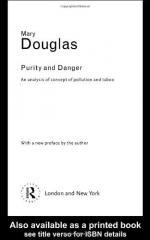
|
| Name: _________________________ | Period: ___________________ |
This test consists of 5 multiple choice questions, 5 short answer questions, and 10 short essay questions.
Multiple Choice Questions
1. Douglas states that if progress is considered to be differentiation, primitive culture is more what?
(a) Systematic.
(b) Unified.
(c) Tolerant.
(d) Supernatural.
2. According to Malinowski, where do rituals derive from?
(a) Rationale.
(b) Harmony.
(c) Logic.
(d) Emotions.
3. Which of the following does Douglas believe can disrupt schematizing?
(a) Anomalies.
(b) Order.
(c) Patterns.
(d) Purity.
4. What is medical materialism based on?
(a) Sumerian beliefs.
(b) Philosophical beliefs.
(c) Practical health routines.
(d) Sanitary conditions.
5. What does Douglas say primitive cultures represent more than modern cultures?
(a) Purity.
(b) Rituals and rites.
(c) Fragmented rules.
(d) Pattern rules.
Short Answer Questions
1. What does order reject, according to Chapter 2?
2. What do anomalies represent?
3. Douglas believes that primitive cultures are wrongly assumed to be which of the following?
4. Primitive ideas of which item have various symbolic meanings, due to Douglas' claims?
5. Which of the following describes Douglas' pre-Copernican classification?
Short Essay Questions
1. What were Robertson's beliefs?
2. In Douglas' book, what is the difference between holiness and blessing?
3. Describe the role of compatibility for the Israelites.
4. What were Durkheim's beliefs?
5. What does Douglas believe has led to the belief that primitive cultures are inferior?
6. What does morality ensure, according to Douglas?
7. How is schematizing disrupted, according to Douglas?
8. How does Douglas describe the ways in which purity can be achieved?
9. What was Smith's perception of magic?
10. How does the Old Testament relate to purity, in Douglas' opinion?
|
This section contains 480 words (approx. 2 pages at 300 words per page) |

|




